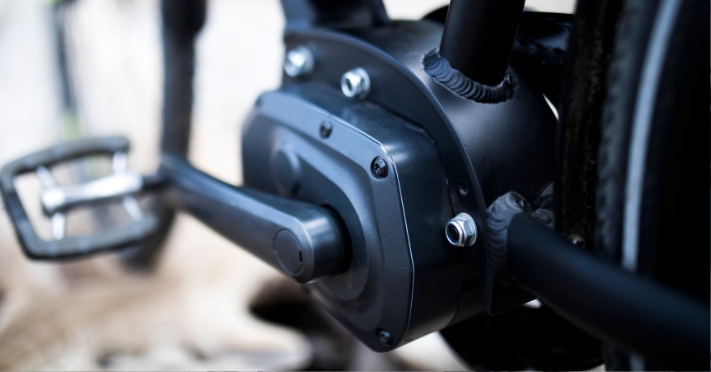The magic power of an electric bike lies in the motor. Thanks to the motor, the bike can help power you forward using its pedal assist system (PAS).
However, not all electric bike motors are created equal. There are two main types of e-bike motors: hub drive and mid-drive. Mid-drive e-bikes are generally considered better because they offer more stability and a lower center of gravity — giving you a smoother ride.
Discover six of our favorite mid-drive motor electric bikes below.
What To Consider When Choosing a Mid-Drive Electric Bike
If you’ve opted for a mid-drive over a hub drive motor, you’ve made a smart choice. A mid-drive electric bicycle usually offers a more comfortable riding experience. But there are some points to consider when shopping for your mid-drive e-bike. We highlight a few.
Power and Performance
Motor power is measured in watts. You’ll see these specs provided by the manufacturer, for example, 250, 500, 750 watts, and so on. The higher the wattage, the more powerful the motor.
Another consideration is torque. When the e-bike motor runs, it creates torque — a force that measures the engine shaft. Torque is measured in a unit called Newton meters (Nm).
You also want to look at battery capacity. This is measured in amp hours and tells you how much power the battery can hold. The higher the number, the farther the bike can ride on a single charge.
Comfort and Convenience
Cycling is supposed to be fun. An uncomfortable bike can ruin it! Consider these three points to maximize comfort and convenience when cycling:
- Frame style: Different bike frames suit different purposes. For example, a commuter bike frame is ideal for commuting. If you want to race cross-country, a road bike is better. In contrast, an electric mountain bike (e-MTB) is for off-road riding. An e-MTB has full suspension and fat tires, which makes the ride feel smoother and adds stability on unpaved surfaces.
- Step-through vs. high-step: A high-step frame requires you to mount the bike by swinging your leg over the seat. With a step-through (or step-thru) frame, you can step right into it. A step-through frame might be better for kids or people with mobility issues.
- Personal fit: Once you pick the bike frame, you have to fit it to your body. This means adjusting the seat post and handlebars.
- Comfort features: Finally, look for features that enhance comfort and convenience, like a kickstand, rear rack, fenders, headlights, tail lights, and LCD.
Price and Value
An e-bike can cost anywhere from $600 to more than $8,000. For a decent mid-drive model, expect to spend around $3,000 to $4,000.
Note that many factors impact a bike’s price, not just the type of motor. For example, a titanium bike frame costs much more than an aluminum alloy frame. Similarly, a bike will be more costly if it has a torque sensor — which measures your pedal power and adapts the motor’s power accordingly.
Check out state tax credits and rebate programs to save on your e-bike. You might be able to get money back on your e-bike purchase.
Top 6 Mid-Drive Electric Bikes for 2023
Is 2023 the year you buy your mid-drive e-bike? Here are some high-quality picks.
Ride1UP Prodigy
The Ride1UP Prodigy has a powerful motor that can reach top speeds of 28 miles per hour (mph) and has an excellent 90 Nm of torque. It also has a good-sized 504-watt-hour frame-integrated battery. Pick from a step-over or step-through frame.
Reviews of the Ride1UP Prodigy love its affordability and the smooth ride it gives, as well as the sleek appearance. That said, some reviewers would like to see pedal upgrades and a better front shock.
Pros:
- 9-speed Shimano Alivio gearing
- Dual piston hydraulic disc brakes
- Front and rear LED lights
Cons:
- No throttle assist
- Uncomfortable seat
- Bad pedals for trail riding
Price: Starting at $2,195
Best for: Budget-conscious buyers
Trek Allant+ 8S Stagger
The Trek Allant+ 8S has a great range of 55 miles and a battery that charges in just six hours. Another highlight is the COBI.Bike app, which lets you use your phone as a controller to check your bike’s stats (like speed and battery capacity).
In our review of the Trek Allant+ 8S, we summed this bike up as light yet powerful. The BOSCH Performance Speed motor doesn’t lag. That said, the bike doesn’t come with throttle assist, and the 11-tooth highest gear isn’t the most comfortable, requiring a lot of pedal power.
Pros:
- Good range
- Three frames to choose from
- App allows you to use your phone to control the bike
Cons:
- No throttle assist
- High-level gearing can be strenuous
- Rear rack can accommodate only a pannier, not a trunk bag
Price: Starting at $4,449.99
Best for: Hilly routes
Gazelle Ultimate T10
The Gazelle Ultimate T10 offers high levels of comfort on bumpy roads thanks to the integrated 30-millimeter (mm) suspension front fork and active posture. This bike also features 65 Nm of torque and a 500-watt-hour integrated battery.
Reviewers love the bike’s comfortable ride, smooth power, and excellent braking system. They also note the award-winning design. That said, the bike isn’t perfect. It lacks smart connectivity, and the LCD screen is modest.
Pros:
- 10-speed Shimano Deore drivetrain
- 70-mile range
- High-quality BOSCH motor
Cons:
- No smart connectivity
- Small LCD screen
- Limited frame selection
Price: Starting at $3,999
Best for: Bumpy rides
Specialized Turbo Vado 3.0
The Specialized Turbo Vado 3.0 features a specialized kickstand and commuter pedals, making it great for city riding and jobs like delivery driving. It has a 42V battery and a 50 Nm torque motor with 250 watts.
In our review of the Specialized Turbo Vado 3.0, we were big fans of its durable and weather-resistant frame. We also love the internal cable routing. Drawbacks include the low motor power and limited range.
Pros:
- Shimano hydraulic disc brakes
- Lightweight aluminum frame
- Includes safety features like a bell, taillight, and headlight
Cons:
- Limited range
- Low power motor
- Not suited for hilly routes
Price: Starting at $3,250
Best for: Everyday commuting
Verve+ 2 Lowstep
The Verve+ 2 Lowstep prioritizes comfort and safety, featuring a 250-watt 40Nm motor and top speeds of 20 mph. It has puncture-resistant tires, hydraulic disc brakes, and a 400-watt-hour battery.
Reviewers of the Verve+2 Lowstep like its stability and safety and rank it high for comfort. However, many people complain about the lower-power motor, saying the price point doesn’t match the quality of the motor.
Pros:
- Alpha gold aluminum frame
- Comfortable Bontrager Boulevard saddle
- Comes with safety and comfort features like ergonomic grips, stability tires, and front and rear lights
Cons:
- Not great for hills
- Cargo bag is tough to remove
- Pricey for the power it gives
Price: Starting at $2,849.99
Best for: Safety-conscious consumers
Bulls Iconic Evo TR 1 Speed
The Bulls Iconic Evo TR 1 Speed is a full-suspension bike you can take on and off the road. You can even comfortably hop curbs on it. It features a BOSCH Gen4 CX motor that goes up to 28 mph.
Reviewers like the bike’s durability and the variety of frame sizes available. Other perks include the frame-integrated BOSCH PowerTube battery and 180-mm hydraulic disc brakes. That said, this bike is on the heavier side.
Pros:
- Powerful hydraulic disc brakes
- Protective aluminum fenders
- Available in four frame sizes
Cons:
- No quick release on the rear wheel
- Heavier build at about 61 pounds
- On the pricier side
Price: Starting at $5,799
Best for: Aggressive riding
Mid-Drive E-Bike FAQ
These motor e-bike FAQ give you the facts on mid-drive motors.
What Is the Difference Between a Hub Motor and a Mid-Drive Motor?
Mid-drive motors are located on the bike’s bottom bracket between the two pedals. In contrast, hub-drive motors are at the bike’s front or rear wheel hub.
In a mid-drive motor, the bike’s drivetrain transfers the motor’s power to the back wheel so that the bike goes forward. In a hub motor, the motor is directly integrated into the wheel.
Can I Still Pedal a Mid-Drive E-Bike?
Yes, you can pedal a mid-drive e-bike. The e-bike motor’s pedal assist system (PAS) is optional. You don’t have to engage it. However, the motor can make for an easier, more comfortable ride while pedaling, amplifying your pedal power.
What Is the Average Price of a Mid-Drive E-Bike?
A mid-drive e-bike can range from $600 to upward of $8,000. The average mid-drive e-bike costs about $3,000 to $4,000, but there’s a range of prices for all budgets.
Find Trusted E-Bike Reviews at eBikes.org
Buying the right e-bike starts with the right research. That’s what we’re here for. eBikes.org offers buying guides and product reviews of top electric bike brands, giving you the essential info you need.
Learn more about e-bikes.

